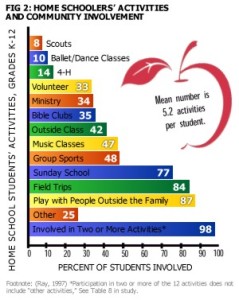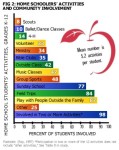by the Home School Legal Defense Association:
Where do I find curriculum and materials?
There’s an ever-increasing variety of curriculum—from traditional textbooks to homeschool-specific curriculum and correspondence courses. Thankfully, experienced homeschool moms have put together review guides, saving newcomers time and frustration. Just two such guides are Mary Pride’s Complete Guide to Getting Started in Homeschooling and Cathy Duffy’s 101 Top Picks for Homeschool Curriculum.
Start by contacting homeschooling veterans in your local and/or state support group—ask what they have tried, what has or has not worked for them, and why. You need to get to know your child’s learning style. Attend a couple of homeschool seminars and curriculum fairs where you can look at your options firsthand. To find a support group or state homeschool convention near you, visit HSLDA’s website.
How much time does it take?
A lot less than you think. Homeschooled students don’t have to take time to change classes or travel to and from a school, so they can proceed at their own pace. In elementary years especially, parents and children often find that they may only need a few hours to accomplish their work for the day.
What if I have several children in different grade levels?
You’ll be surprised at the subjects that can span grade levels. Certain curricula lend themselves to multilevel teaching. You can design your program so that older children work independently in the morning while you work individually with younger children, and then while younger children take naps in the afternoon, you can have one-on-one time with older students.
What about my child’s special needs?
Thousands of families are homeschooling children whose special needs range from Attention Deficit Disorder to severe multiple handicaps. Parents often find that when they bring these children home to be educated, they come out of the “deep freeze” that has kept them from making significant progress. Gone are the comparisons, labels, social pressures, and distractions that a regular classroom may bring. Parents can offer their children individualized education, flexibility, encouragement, and support, which may be ideal for children who are learning-disabled, medically sensitive, or attention-deficit. HSLDA offers resources and help at www.hslda.org/strugglinglearner.
What about socialization & special interests/enrichment activities?
Research has found that most homeschooled students are involved in a wide variety of outside activities, interact with a broad spectrum of people, and make positive contributions to their communities. Experience has shown that homeschoolers are well socialized and able to make lasting friendships across age and cultural divides.
What about the high school years?
Homeschooling your child through high school offers great benefits for parents and students. Sure, there will be challenges such as more difficult subject matter. On the other hand, your high schooler requires less supervision and can take increasing charge of his own education. You can do it, and HSLDA wants to help you! Check out the great resources at www.hslda.org/highschool. HSLDA’s two high school coordinators—moms who’ve graduated their own children from high school at home—bring a wealth of experience and friendly advice to share with member families who are navigating these challenging, yet exciting years.
What about a diploma, graduation, & college?
Homeschool graduates closely parallel their public school counterparts—about two-thirds go on to post-secondary education, and one-third directly into the job market. (Brian Ray, Strengths of Their Own—Home Schoolers Across America, NHERI, 1997.)
Homeschool students who have utilized community colleges for foreign language, lab science, or higher mathematics courses discover as an added bonus that these course credits make it easier to enroll in four-year colleges after high school graduation.
Article originally posted at HSLDA.org.



